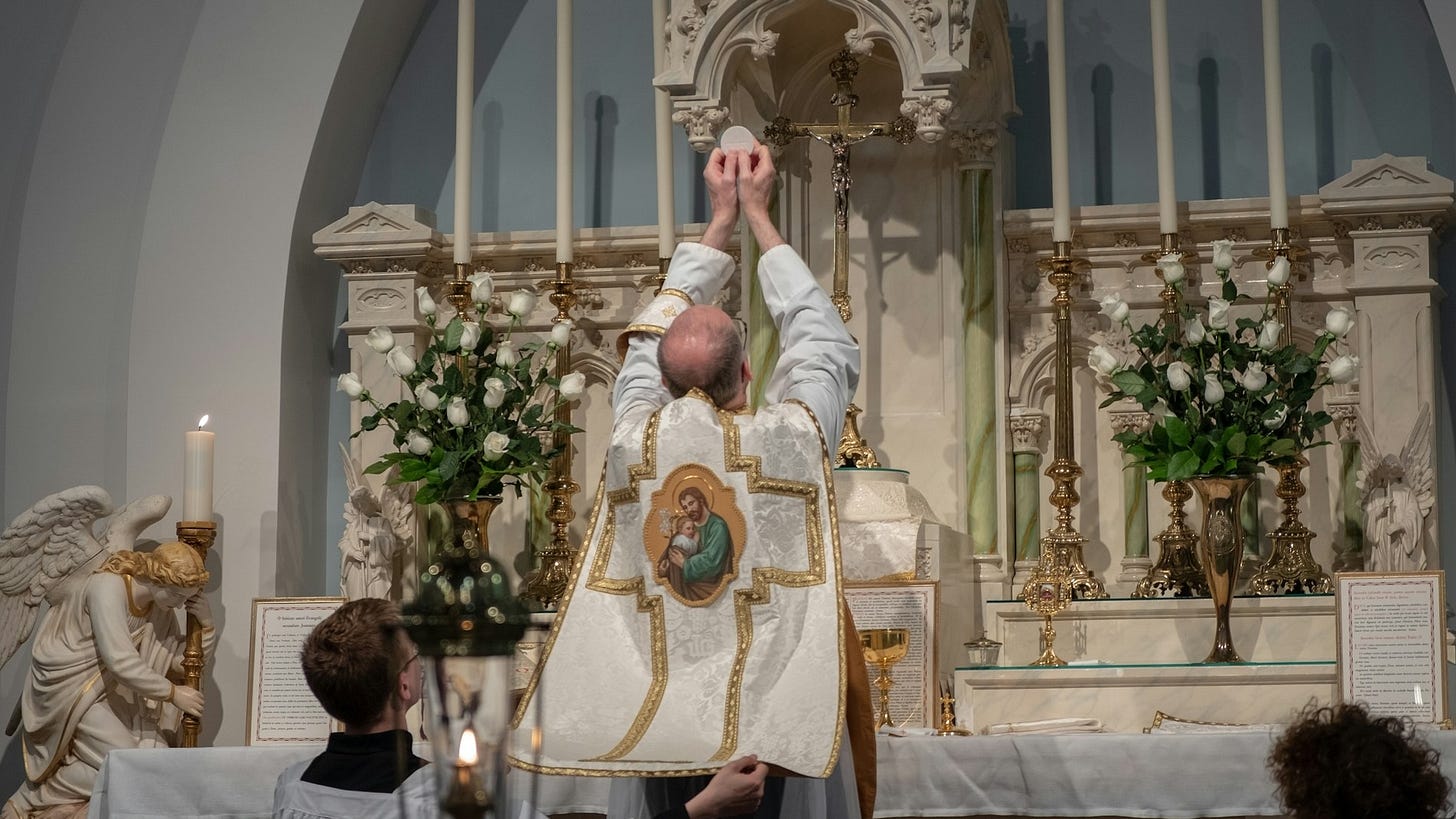The Holy Sacrifice of the Mass: The only foundation of true freedom
We have surrendered our freedom, and compromised our spiritual integrity. Only divine worship, the Holy Sacrifice of the Mass, and contemplation can bring us to true human freedom.

Be still and know that I am God.
I will be exalted among the nations; I will be exalted in the earth. (Psalm 47:11)
Introduction
In his 1947 essay Leisure the Basis of Culture the German philosopher Josef Pieper wrote:
“[I]t might be asked whether we are not all of us proletarians and all of us, consequently, ripe and ready to fall into the hands of some collective labour State and be at its disposal as functionaries.”1
Pieper’s fears, expressed at a time when Communism seemed ready to overwhelm post-war Europe, are in the process of being realised. The events of the last two years have revealed the moral and intellectual bankruptcy of the modern west. Overnight the peoples of Europe, America and Australasia have surrendered basic freedoms in response to the lies and propaganda of an elite seeking to establish totalitarian control. Under the guise of public health, the political and economic elite is attempting the enslavement of the masses, and the majority are submitting, preferring what they presume to be the interests of their physical health, to their intellectual, moral and spiritual integrity.
How ought we respond to this unprecedented encroachment by the state on the rights of the Church, the family and the individual?
In place of chemical “immunization” we need what Pieper, back in 1947, called “spiritual immunization against the seductive appeal and power of totalitarian forms” which “must, surely, be sought and hoped for at a much deeper level of thought than on the level of purely political considerations.”2
In this article we will explore Pieper’s argument that at the root of modern man’s despair – and his consequent willingness to submit to totalitarianism – lies a false conception of the relationship between work and leisure, and between action and contemplation. There is, he proposes, one crucial route to return to sanity: the Holy Sacrifice of the Mass and the observance of the holy day of Sunday.
Modern man’s despair
When we observe our fellow citizens conforming cravenly yet zealously to the latest dictates of the totalitarian medical regime – wearing masks, shunning social contact, acquiescing in the destruction of the livelihoods of their neighbours, and proudly submitting to an experimental treatment – we will easily recognise Joseph Pieper’s description of modern man as he was already clearly manifested in 1947:
“[T]he fixed, mask-like readiness to suffer in vacuo, without relation to anything. It is the absence of any connection with reality or real values that is distinctive. And it is because this readiness to suffer (which has been called the heart of discipline, of whatever kind) never asks the question ‘to what end’ that it is utterly different from the Christian conception of sacrifice.”3
This is a description of men and women who have so lost connection with what is real and true – both objective reality and their authentic subjective experience of reality – that they are willing to conform themselves to the false and anti-Christian ideologies promoted by those wielding economic and political power. However:
“The Christian conception of sacrifice is not concerned with the suffering involved qua suffering, it is not primarily concerned with the toil and the worry and with the difficulty, but with salvation, with the fullness of being, and thus ultimately with the fullness of happiness: ‘The end and the norm of discipline is happiness.”4
That is to say, the life of the Catholic is ordered towards that which is good, true and beautiful, for which he may have to suffer – even unto death – but it is not ordered to suffering for suffering’s sake, and certainly not to suffering for the sake of the power and wealth of an anti-Christian elite.
The false doctrine of the merit of suffering for suffering’s sake – which has unfortunately influenced many Catholics – is wholly contrary to the doctrine of St Thomas Aquinas.
The Angelic Doctor teaches that:
“Virtue essentially regards the good rather than the difficult. Hence the greatness of a virtue is measured according to its goodness rather than its difficulty.”5
And also:
“The ‘good’ has, more than the ‘difficult,’ to do with the reason of merit and virtue. Therefore, it does not follow that whatever is more difficult is more meritorious, but only what is more difficult, and at the same time better.”6
Work vs. Leisure
The error that suffering is valuable for its own sake, rather than because of the good for which we suffer, is closely related to a second error which dominates the modern mind, and which makes our contemporaries particularly vulnerable to surrendering fundamental freedoms in return for material prosperity. This is the error that work has value in and of itself, disconnected from the end for which it is performed.
This error is well expressed in a popular quotation cited by Max Weber in his classic work The Protestant Work Ethic and the Spirit of Capitalism: “one does not work to live; one lives to work”.7 This view – which would be considered non-controversial by many of our contemporaries – is exactly opposite to the teaching of Aristotle, which represents the true spirit of the classical and medieval west:
“[H]appiness is thought to depend on leisure; for we are busy that we may have leisure.”8
That is, we work in order that we may have the necessities of life, which allow us to enjoy leisure. This view is incomprehensible to those who see the creation and enjoyment of material wealth as the essential function of human life. It is both comprehensible and urgent to those who view contemplation – natural and supernatural – as the real end of human existence.

